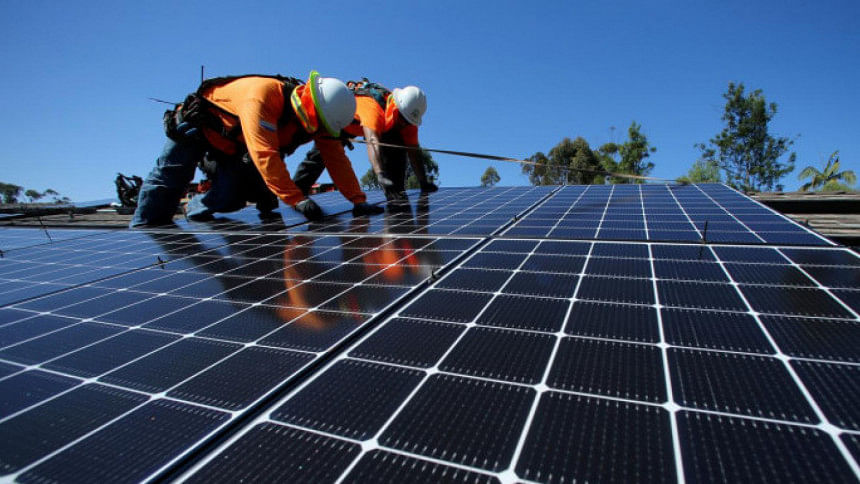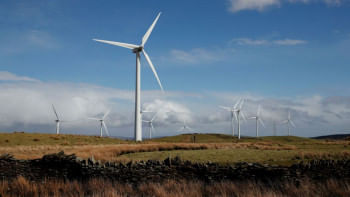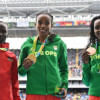Renewable energy needs proactive financial boost

As Bangladesh faces challenges of climate change and fiscal sustainability, the need for transitioning towards clean energy sources and green technologies has become more apparent. The newly elected government, in its inaugural budget for FY2024-25, is expected to take suitable fiscal and budgetary measures to promote the use of green and clean energy in the country. The Centre for Policy Dialogue (CPD) has proposed a list of fiscal and budgetary measures for the upcoming national budget targeting important sectors including power, transport, agriculture and manufacturing and their financing. The proposed measures are as follow:
Enhance allocations, number of renewables projects: Recent observations reveal a concerning trend of underfunding in renewable energy projects, with a 2.47 percent allocation in the Annual Development Programme (ADP) for FY2023-24. Such an allocation not only raises questions regarding the timely completion of crucial projects, but also undermines the country's ambitious goals of achieving 40 percent renewable energy in the power mix by 2041. Currently, there are a total of 99 approved power and energy-related projects in 2023-24 ADP, and only five of them are renewables-based. To address this gap, the CPD recommends that the upcoming national budget implement more renewable energy-based projects and allocate greater resources to such projects, prioritising key initiatives such as solar photovoltaic power plants and the enhancement of coastal transmission systems.
Extend tax incentives: Current tax structures continue to favour fossil fuel-based investments, posing a barrier to the widespread adoption of renewable energy solutions. By extending tax holidays from five years to 10 years for renewables-based power plants, providing 100 percent duty waivers to small-scale solar-based projects, and lowering the cumulative tax rate on solar power-related accessories, Bangladesh can create a more conducive environment for clean energy ventures.
Ease eligibility for renewables producers: Private sector power generation companies can access tax exemptions and benefits outlined in specific statutory regulatory orders (SROs) if they have power sale or purchase agreements with the government. The CPD recommends that any company generating or producing electricity through renewable energy under the Net Metering Guideline 2018 be inserted into the SRO.
Limit using reconditioned ICE cars: The current duty structure does impose a higher tax on Internal Combustion Engine (ICE)-based vehicles than hybrid or electric vehicles (EV). But there is still major room for improvement regarding the duty structure in the transport sector. In the current market scenario, customers still mostly opt for imported reconditioned ICE cars. Reconditioned cars have worse safety and emission standards than new ICE or hybrid cars. The current duty structure should be tailored in favour of hybrid vehicles so that customers feel incentivised to opt for new hybrid cars instead of reconditioned ICE cars. The supplementary duty on hybrid microbuses should be lowered than that on ICE microbuses. Also, the current regulation states that imported reconditioned cars cannot be older than four years; this should be decreased to three years to further discourage reconditioned car import.
Revise EV duty structure: The current tax structure for EVs equates 1kW of electric motor capacity to 20cc of the ICE for annual tax purposes. This comparison has resulted in a tax disparity that affects affordability. For context, even an entry-level EV has a motor capacity of 110kW. In general, affordable EVs come with engines ranging from 100kW to 150kW, but the current annual EV tax structure states that the owner of an EV with 100-120kW will have to pay Tk 75,000 in annual taxes. Most car owners in Bangladesh own vehicles under 1,600cc and pay Tk 25,000 in annual taxes. This customer base is precisely the target audience for entry-level EVs, and given the current annual tax structure, they will have to pay three times more if they opt for EVs. Furthermore, the existing tax incidence on EV imports, including an 89 percent import duty, 20 percent SD, and a fixed advance income tax of Tk 3 lakh per unit brings the total cost of EV ownership close to traditional vehicles in the same price range, providing little incentive for consumers to switch to EVs. This should be immediately restructured to create market level incentive for mass EV adoption.
Reduce TTI for lithium batteries: The total tax incidence (TTI) on lithium batteries in Bangladesh is 89 percent—almost double that of India. This will hinder the country's potential as an EV assembler and manufacturer. The tax structure should be revised to accelerate Bangladesh's manufacturing competitiveness.
Reduce customs duties on solar products: Various global agencies estimate that rooftop solar systems alone hold the potential to produce 5,000MW of electricity in Bangladesh, including a 400MW capacity specifically from the textile sector. The adoption of solar energy could yield massive fiscal savings, potentially sparing the government between Tk 5,230 crore and Tk 11,032 crore annually, courtesy of an estimated 2,000MW of rooftop solar capacity. Nevertheless, the growth of solar energy in Bangladesh is hampered by steep import duties and taxes on solar products, which substantially inflate installation costs. While solar panels incur a minimal tax of one percent, solar inverters face a hefty 37 percent duty. Moreover, the TTI on solar accessories ranges from 26.2 percent to 58.6 percent, further escalating costs for businesses. Additionally, the current Net Energy Metering (NEM) policy, with a 10MW cap, significantly limits expansion possibilities. Reducing customs duties on solar products and offering subsidies especially for SMEs could drastically decrease installation costs. Furthermore, establishing a streamlined and standardised NEM process could be a step in the right direction.
Devise a unified tax strategy to lower TTI for SIPs: Solar irrigation pumps (SIPs) offer a cost-effective alternative to traditional diesel and electric pumps, whose annual operational costs surpass $1 billion. Despite their benefits, only 2,971 SIPs are in use, making up a mere 0.22 percent of the total pumps due to high initial costs and insufficient fiscal incentives. Yet, the economic advantages are clear, with solar irrigation being more affordable than conventional methods. However, the cumulative taxes including VAT, AIT and others raise the overall expense, deterring widespread adoption. A unified tax strategy to lower the TTI to one to five percent is crucial. Furthermore, promoting grid-integrated SIPs to allow energy export during off-peak times, coupled with subsidies for grid connection for smaller farms, could accelerate the shift towards solar energy, offering substantial support to the agricultural sector.
Put effort into clean energy financing: Ensuring energy financing would be crucial for Bangladesh to achieve its clean energy target. According to a report of the Change Initiative, Bangladesh would require an amount of $26.5 billion to achieve this target. Besides, data indicates that 39 percent of the committed support from development partners for the power sector is still to be disbursed. In the upcoming years, the government needs to ensure the disbursement of the remaining support and explore additional funding sources. In addition, it should intensify negotiations to secure funds from bilateral, multilateral, and regional sources. Different global climate funds and clean energy and green technology funds should also be a priority.
The authors are working at the CPD Power and Energy Study.
Dr Khondaker Golam Moazzem is the research director at Centre for Policy Dialogue (CPD).
Tamim Ahmed is senior research associate at CPD.
Fardeen Kabir is a programme associate at CPD.
Sarara Jafrin is surveyor at CPD.
Views expressed in this article are the author's own.
Follow The Daily Star Opinion on Facebook for the latest opinions, commentaries and analyses by experts and professionals. To contribute your article or letter to The Daily Star Opinion, see our guidelines for submission.

 For all latest news, follow The Daily Star's Google News channel.
For all latest news, follow The Daily Star's Google News channel. 












Comments